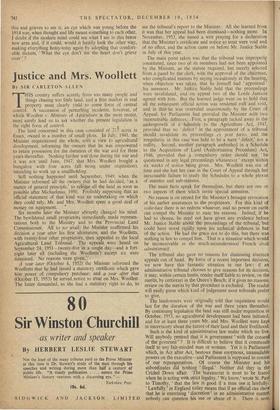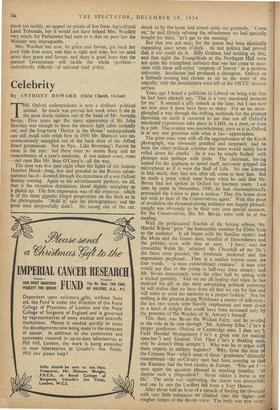Justice and Mrs. Woollett
By SIR CARLETON ALLEN THIS country suffers acutely from too many people and things chasing too little land, and a free market in real property must clearly yield to some form of central control. A succession of perturbing incidents, however, of which Woollett v. Minister of Agriculture is the most recent, must surely lead us to ask whether the present legislation is the right form of control. The land concerned in this case consisted of 211 acres in Essex, owned in a number of small plots. In July. 1941. the Minister requisitioned the whole, with a view to agricultural development. informing the owners that he was empowered /- to retain possession for the duration of the war and for three years .thereafter. Nothing further was done during the war and it was not until June, 1947, that Mrs. Woollen bought a bungalow with four acres (all being under requisition), intending to work up a smallholding. Still nothing happened until September. 1949, when the Minister informed all the owners that he had decided, ' as a matter of general principle,' to release all the land as soon as possible after Michaelmas, 1950. Foolishly supposing that an official statement of that kind was an undertaking on which they could rely, Mr. and Mrs. Woollett spent a good deal of money on equipment. . . Six months later the Minister abruptly changed his Mind. The bewildered small proprietors immediately made represen- tations both to the Ministry and to the Provincial Land Commissioner. All to no avail; the Minister reaffirmed his decision a year after his first ultimatum, and the Woolletts, with twenty-four other proprietors, then appealed to the local Agricultural Land Tribunal. The appeals were heard on September 24, 1951--twenty-five in a single day --and a fort- night later all (including the Woolletts') except six were dismissed. No reasons were given..
A year later (October 4, 1952) the Minister informed the Woolletts that he had Issued a statutory certificate which gave him power of compulsory purchase; and a year after that (October 15. 1953) he served,notice to treat on Mrs. Woollett. The latter demanded, as she had a statutory right to do, to see the tribunal's report to the Minister.. All she learned from it was that her appeal had been dismissed—nothing more. In November, 1953, she issued a writ praying for a declaration that the Minister's certificate and notice to treat were void and of no effect, and the action came on before Mr. Justice Stable in July of this year.
The main point taken was that the tribunal was improperly constituted, since two of its members had not been appointed by the Minister, .as the statute required, but merely selected from a panel by the clerk, with the approval of the chairman, who complicated matters by saying incautiously at the hearing, when objection was taken, that he himself had 'appointed' his assessors. Mr. Justice Stable held that the proceedings were invalidated, and on appeal two of the Lords Justices agreed with him. But the learned judge went on to hold that all the subsequent official action was rendered null and void, and in this he was overruled unanimously by the Court of Appeal, for Parliament had provided the Minister with two impenetrable defences. First, a paragraph tucked away in the undergrowth of a Schedule to the Agriculture Act, 1947, provided that no ' defect ' in the appointment of a tribunal should invalidate its proceedings ex post facto, and the irregularity in this case was held to be a there defect,' not a nullity. Second, another paragraph ambushed in a Schedule to the Acquisition of Land (Authorisation Procedure) Act, 1946, 'provided that a compulsory order should not be questioned in any legal proceedings whatsoever' except within six weeks of notice being given. Mrs. Woollett was out oe time and she lost her case in the Court of Appeal through her inexcusable failure to study the Schedules to a whole plexus of statutes and sub-statutes.
The main facts speak for themselves. but there are one or two aspects of them which invite special attention.
No reason is on record for the Minister's brusque revocation of his earlier assurances to the proprietors. For this kind of voile-face there is no redress whatever, and no power on earth can compel the Minister to state his reasons. Indeed, if he had so chosen, he need not have given any evidence before Mr. Justice Stable about the proceedings of the tribunal, but could have stood rigidly upon his technical defences in baC of the action. He had the grace not to do this, but there was nothing in law to compel him. That is a situation which would be inconceivable in the much-misunderstood French &wit caministratif.
The tribunal also gave no reasons for dismissing nineteen appeals out of hand. By force of a recent important decision, we now have this fantastic situation in our law: if an administrative tribunal chooses to give reasons for its decision, it may, within certain limits, render itself liable to review, on the merits, by certiorari in the Queen's Bench; if it gives no reasons, review on the merits by that procedure is excluded. The reader will easily guess which kind of judgement most tribunals prefer to give. , The landowners were originally told that requisition would last for the duration of the war and three years thereafter. By continuing legislation the land was still under requisition in October, 1953, no agricultural development had been initiated, and for at least three years Mr. and Mrs. Woollett were kept in uncertainty about the future of their land and their livelihood.
Such is the kind of administrative law under which we live. Will anybody pretend that it is government 'with the consent • of the governed '? it is difficult to believe that it commends itself to any fair-minded man or woman. Yet it is Parliament which, in Act after Act, bestows these enormous, unassailable powers on the executive—and Parliament is supposed to consist of our represptatives. Of course the Minister and his subordinates did nothing illegal.' Neither did they in the Crichel Down affair. The bureaucrat is most to be feared when he is acting with strict legality. We know,' wrote St. Paul to Timothy, 'that the law is good if a man use it lawfully.. 'Lawfully' in England today means that if an official can shovi that he is exercising 'discretion' in an administrative matter, nobody can question his use or abuse of it. There is rioskr, much too tardily, an appeal on points of law from Agricultural Land Tribunals, but it would not have helped Mrs. Woollen very much, for Parliament had seen to it that on pure law the Minister was impregnable. Mrs. Woollett has now, by grace and favour, got back her poor little four acres, and that is right and wise; but we need more than grace and favour, apd there is good hope that the present Government will tackle the whole problem— undoubtedly difficult—of national land policy.









































 Previous page
Previous page